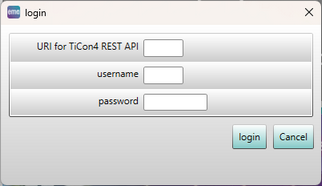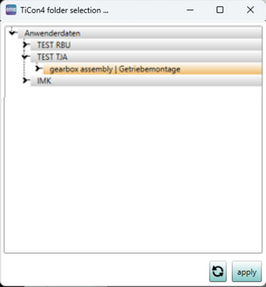The toolbar for TiCon 4 is activated via the menu bar (see chapter User interface / Menu bar / Im-/Export). If this option is selected, a login dialog box appears in which the URL for the TiCon4 REST interface must be specified, along with the user name and password for the TiCon account.

Figure 214: TiCon login
This information can also be stored in the settings (see chapter Menu bar / Options / Settings / TiCon4).
![]()
Figure 215: TiCon toolbar
Once the connection has been successfully established, a destination or source folder can be specified. The subsequent workflow varies depending on the use case.
Upload: emaWD -> TiCon 4
An ema simulation with a calculated MTM-UAS analysis is required. A folder from TiCon is specified as the target folder in the toolbar, in which the ema project is to be saved as a subfolder. The name of the simulation in the Simulation project tab is used as the name of the project in TiCon. (see chapter User interface / Tab "Simulation project").
To upload, click the ![]() Upload button. If the data transfer was successful, the ema project will be available in the selected destination folder after an update in TiCon. The structure is based on the behavior structure created in ema; behavior groups form parent folders for the human models contained therein. No object behaviors are transferred.
Upload button. If the data transfer was successful, the ema project will be available in the selected destination folder after an update in TiCon. The structure is based on the behavior structure created in ema; behavior groups form parent folders for the human models contained therein. No object behaviors are transferred.

Figure 216: Comparison of the structures in ema and TiCon after the upload
The content of a transferred human model is the AN module. It contains the complete analysis, as it is also available in ema.

Figure 217: Comparison of the MTM-UAS analysis in ema and TiCon after the upload
Download: TiCon 4 -> emaWD
An MTM-UAS analysis created in TiCon can be transferred to an empty ema in order to create a simulation on this basis. In the TiCon toolbar, the direct project from the TiCon structure is selected for this application.

Figure 218: TiCon folder selection
After selecting the desired project, click the ![]() Download button. All workers named in the analysis are then created with their task groups. These task groups contain waiting tasks with the corresponding MTM-UAS time as the default target time and the associated MTM-UAS code as a comment. The cycle time is also transferred. After the transfer, a simulation start model is available and can be supplemented with further tasks.
Download button. All workers named in the analysis are then created with their task groups. These task groups contain waiting tasks with the corresponding MTM-UAS time as the default target time and the associated MTM-UAS code as a comment. The cycle time is also transferred. After the transfer, a simulation start model is available and can be supplemented with further tasks.

Figure 219: Comparison of the analysis in TiCon and the behavior in ema after the download